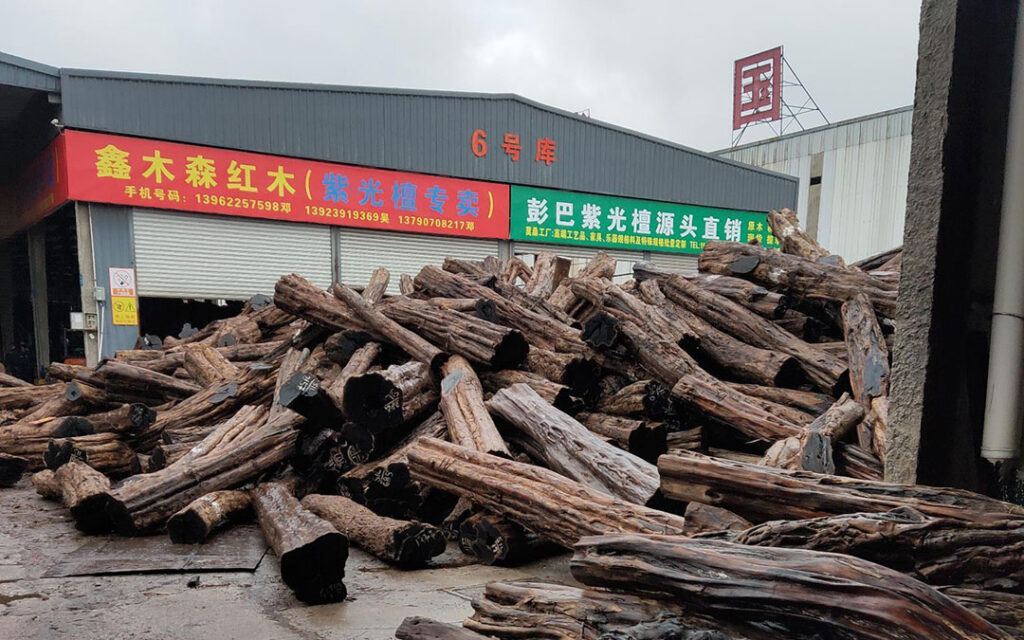ADF STAFF
Millions of metric tons of illegally harvested timber smuggled from Mozambique to China are helping to fund one of Africa’s deadliest insurgencies, according to a newly published report.
China’s illicit trade in rosewood, estimated to be worth hundreds of millions of dollars a year, is linked to the financing of Mozambique’s Islamic State-linked militants, according to the Environmental Investigation Agency (EIA), an organization that fights environmental crime.
“In brazen violation of [Mozambique’s] log export ban, Chinese timber dealers buy logs for a few dollars and sell them in China, where they can be turned into luxury furniture selling for tens of thousands of dollars,” the agency said on its website.
Rosewood has become the most trafficked natural product in the world, largely due to demand from China, where it is a prized commodity. While rosewood logging in China is banned, the country continues to import huge quantities, including about 20,000 metric tons from Mozambique’s ancient forests in 2023.
For its report, the EIA conducted a four-year undercover investigation in Mozambique and China and interviewed more than 30 sources involved in the Cabo Delgado timber sector. Cabo Delgado is the country’s northernmost province.
“For many years, we’ve been looking at the timber sector in Cabo Delgado, Mozambique, and we’ve seen massive volumes of illegal timber being exported from the country, unprocessed in log form, most of it going to China,” EIA analyst Alex Bloom, lead author of the report, told the BBC. “We found that in the province of Cabo Delgado there is a nexus between this illicit timber trade and the insurgency that has been occupying the north of the country. Since 2017 over 500,000 tons of unprocessed wood has been imported by China from Mozambique annually.”
Since 2017, Islamic State-Mozambique (ISM) fighters have terrorized Cabo Delgado, killing more than 6,500 and displacing nearly 1 million people.
“Timber traders buy wood from different forests around the province of Cabo Delgado, including illegal sources and from insurgency-occupied areas, even areas where insurgents have cut down wood themselves and are benefitting from the sales,” Bloom said. “All of that wood is then brought to Montepuez, where most of these traders have their sawmill and containerizing processes. The wood is all mixed together and then trucked to Mozambique ports to be exported, most of that to China.”
Researcher Piers Pigou of the South Africa-based Institute for Security Studies suggested the militants could be making money indirectly from the Chinese timber industry.
“Where they could be involved is extracting rents in some way or another,” he told Voice of America. “I think there are some question marks about exactly what the nature of that connectivity to the insurgency would be.”
Mozambique has had a log export ban since 2017, but China continues to import more than 90% of Mozambique’s harvested wood. A Mozambique government report presented to parliament in April said the “illicit trade in species of wild flora and fauna or parts thereof has reached alarming proportions.”
The report also said ISM insurgents have used the illicit timber trade for a “very high level of fundraising” to “fuel and finance the reproduction of violence.” It estimated that ISM’s revenue from the illegal logging trade amounted to $1.9 million a month.
Bloom urged the two countries to take action to stem the “conflict timber” industry.
“The leaders of Mozambique need to wake up and do more to enforce their own forestry laws, specifically their log export ban,” she said. “China needs to do more as well. The government of China unfortunately historically has a no-questions-asked policy when it comes to importing timber with no regard for the legality of the origin.”

